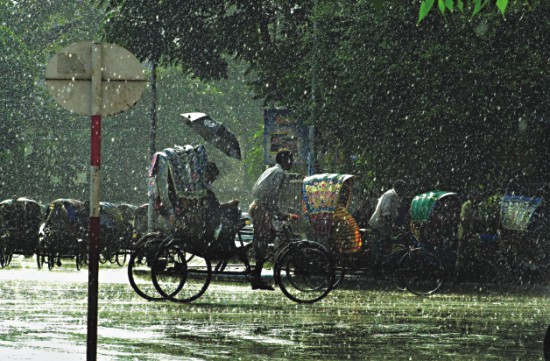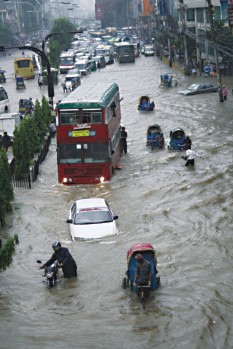
Inside
|
Drastic Times Call for Drastic Measures SYED SAAD ANDALEEB outlines a nine-point traffic policy
Many articles have been written in the media to address the continuing harassment that Dhaka city's residents face daily, posed by the prevailing bizarre traffic situation. These articles reflect the exasperation caused by poor planning and management of the traffic system that saps citizens' vitality before they even start their work day. I would like to offer a comprehensive set of ideas that may be considered by the City's transportation authority for immediate implementation. l Given the limited opportunity to increase road capacity, the authorities must regulate the importation of cars. When road capacity can be increased, additional imports may be allowed, not otherwise. By adding more cars to the existing road capacity, it is conceivable that the traffic will soon crawl to a few yards an hour. Old vehicles that break down and hold up traffic must be retired (a process that is seemingly underway and hopefully will continue with diligence). An auction market could be established for trading "retired" license plates, if owners of retired cars choose to seek bids. l Pursue development of mass transportation system (public buses) with appropriate incentives for the private sector. A two-tier system may be needed -- luxury buses and ordinary buses with different pricing schemes. This would best fit in with the prevailing status-consciousness that exists in society. Most of the regular buses may be designed with limited seating capacity for the women and the elderly, to accommodate the heavy demand for transportation today. The underground or elevated mass transit systems proposed in various forums are terrible ideas for Dhaka that will further disrupt the lives of the citizenry for many years during the period of construction, not to mention the cost overruns (to be pocketed by you know who) and the fact that a different government will surely overturn the process simply because it was the opposition's idea. Elevated expressways or subterranean transportation ought to be saved for the future when other adjoining mega-cities are planned, perhaps near Gazipur or beyond. l Eliminate rickshaws (they occupy far more road space than the efficacy with which they provide service) and find employment for the rickshaw owners and drivers in development activities within and outside Dhaka. The private sector or even the taxpayer may be levied a surcharge to help create jobs needed to remove rickshaws from the streets. For those who are beginning to see red in this solicitation: 1) no modern city in the world uses such a medieval mode of transportation, 2) it is most inefficient with regard to use of road capacity, and 3) rickshaws should be banned on humanitarian grounds just witnessing the daily toil of the rickshaw-puller in rain and sun, and the amount of pollution they inhale standing in a traffic jam should be enough to make a case for cruelty to humans. I do not even want to go into the matter of their health care externality. However, I would advocate a phased elimination of rickshaws as ways are devised to absorb them in other sectors.
l Build multi-storied parking facilities "IN" the city centers, not away from them. In Motijheel, for example, the sufficiently wide roads are occupied by 2-3 layers of parking that narrows down the channels to a single flow. This is unacceptable. Vehicles that do so should be encouraged to park in the multi-storied facilities or to leave the area and return to pick up their passengers at the end of the day instead of jamming up the streets for the entire day. The government may build the first few facilities and lease them out to private parties. A cost-benefit analysis should reveal that the 3-4 storied government buildings that exist in various areas will bring in more revenues if they are dismantled and redesigned for parking space. Of course, if private parties are interested, and I am dumbfounded as to why they haven't yet seen this opportunity, they must be encouraged to build parking spaces with reduced or minimal tax burdens. l Charge fees "electronically" (like EZ Pass in the US that uses "collection technology, featuring an electronic tag installed in users' cars" to be read by devices at the busiest areas of the city) when entering certain high-traffic areas like Motijheel. This is like going into Central London which requires motorists to pay a hefty congestion fee of £8 each day for each vehicle traveling within the zone between 7am and 6pm (Monday-Friday only); a fine of between £60 and £180 is levied for non-payment. Larger gas-guzzling vehicles that leave behind a bigger carbon imprint may be levied a higher fee. In fact, Dhaka City may be zoned and traffic fees may be levied differently for each zone differentially. The Government of Bangladesh is seeking ways to boost revenues; high-traffic zones may be a good source of such revenues. An alternative may be to sell a "park at will" ticket per day. Needless to say, the price of the ticket must be exorbitant; the tickets also must be prominently displayed. As private cars are coaxed (through high priced alternatives) to park in the strategically located parking lots, some people will have to walk a bit from these lots to their offices. If they complain, ask them what they do when they visit overseas! An alternative is to use color-coded buses plying in particular zones to transport people from the parking lot to designated spots. These buses and their operating costs may be paid for by the parking fees. l Introduce odd-even license plate policy for private cars to restrict their numbers on the streets. This may be initiated to encourage car-pooling. Odd plates would drive Sun-T-Thu; even plates would drive M-W-Sat. Friday would be unrestricted. Some have scorned this line of thinking suggesting that it will lead people to buy more cars to cover all days of the week. I would direct them to point number 1 of this article. And for those who will buy that extra car, I doubt their numbers will exceed the halved traffic flow that the odd-even policy would install. For starters, this policy may be implemented twice a week (Sundays and Mondays) for the citizens to feel the difference. A month-long communication program must be initiated via mass media before this policy is implemented. Another policy to encourage car pooling may be to levy daily fees on cars that have only one driver and one passenger. The practice of allowing trucks into and out of the city after 9:00 PM until dawn must be continued. l Encourage tiered office and school hours: some offices/schools based on location should start at 7:00 AM, the next tier at 8:00, 9:00 and 10:00 AM. Those required to open late will also end their operations accordingly at later hours. Today's electronic technologies (cell phones and internet) will not hamper businesses. I believe this has been initiated in some areas, but not vigorously. l Encourage government officials to use mass transportation. There are too many junior officials today who are provided cars which is unnecessary. An alternative is to have government officials "pay" for their use of a government car from their salaries. Given the new salaries they enjoy today (see recent Pay Commission Reports), they may also be required to purchase/lease the cars with a fixed monthly payment. l Levy severe "irresponsibility taxes" on those who have built structures on their properties that violate building codes and leave little room for road capacity expansion. Drastic situations call for drastic measures. It is high time for the traffic planners and administrators to prioritise and "act decisively." And Mr. A.M.A. Muhith, the Honorable Finance Minister, who has been advocating new sources of revenue in his latest budget, ought to be delighted with the idea that Dhaka's traffic can be a new source of high yielding revenues. Dr. Syed Saad Andaleeb teaches at the Sam & Irene Black School of Business, The Pennsylvania State University at Erie, USA. |

